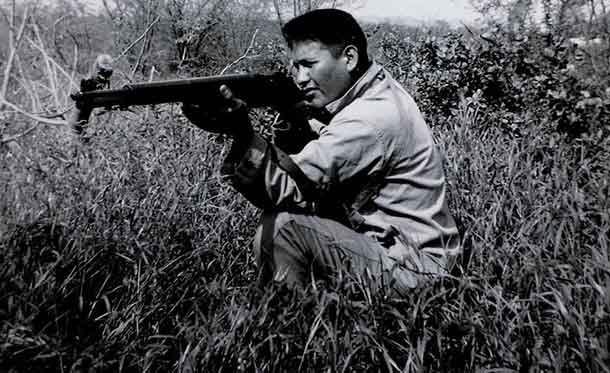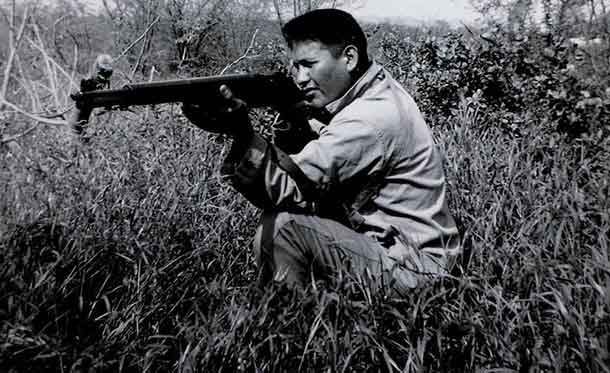

WASHINGTON – More than 70 years ago, a group of Native American Marines known as Navajo Code Talkers used their native tongue, Navajo, to transmit secret strategic messages during World War II.
Guadalcanal, Tarawa, Peleliu, Iwo Jima: From 1942 to 1945, the code talkers took part in every assault the Marines conducted in the Pacific. They served in all six Marine divisions, Marine raider battalions and Marine parachute units, transmitting messages by telephone and radio in their native language — a code that the Japanese never deciphered.
Six Navajo Code Talkers were operating continuously during the invasion of Iwo Jima, a battle that yielded 27 Medals of Honor. They sent more than 800 messages with perfect accuracy.
One of those six was Marine Corps Lance Cpl. Jeanette E. Fernando’s grandfather, Thomas Sandoval.
On July 26, 2017, Fernando had the opportunity to revisit the battlegrounds on which her grandfather fought so many years ago.
Emotional Journey
Her journey began in Okinawa, Japan, where she is currently forward deployed on a unit deployment program with 1st Marine Aircraft Wing. After a three-hour flight, she arrived at Iwo Jima, where she immediately started her 10-mile trek up Mount Suribachi.
“It’s an emotional experience,” said Fernando, an airframe mechanic with Marine Light Attack Helicopter Squadron 169. “There’s quite a connection, just knowing that my ancestors were here fighting in WWII.”
Under a beating sun, Fernando thought about her grandfather and what he must have gone through as she passed numerous rusted aircraft parts, anti-air weapons and other heavy artillery.
“Everything was new to him,” Fernando said. “But that didn’t stop him. I’m able to be in Iwo Jima because of my ancestors, because of the Marines who fought so proudly before me.”
Drenched in sweat and with aching muscles, Fernando made it to the summit. After a moment of silence, she removed her dog tags and placed them on the memorial to honor her grandfather and the other warriors that fought for the island.
“It was difficult, but we pushed through it and made it to the top — it was all worth it,” Fernando said. “I put myself in my ancestors’ boots who were here before me. I can’t imagine what they had to go through. They were pushing through day and night.”
After a moment of rest she began the long journey back down the mountain. Halfway down, she reached Invasion Beach. She made her way down the steep decline to the beachhead, where she began gathering sand to take home and to the Marines back in her squadron.
With an added 20 pounds of sand strapped around her shoulders, Fernando made her way back to the plane with determination in her eyes and encouraging words for her fellow Marines.
“Words can’t describe how it feels to stand on the land where my ancestors fought so hard to gain,” Fernando said. “I’m very grateful for what [the Navajo Code Talkers] sacrificed. They had the courage and dedication to participate in the program. I’m proud to be part of the Navajo nation.”
